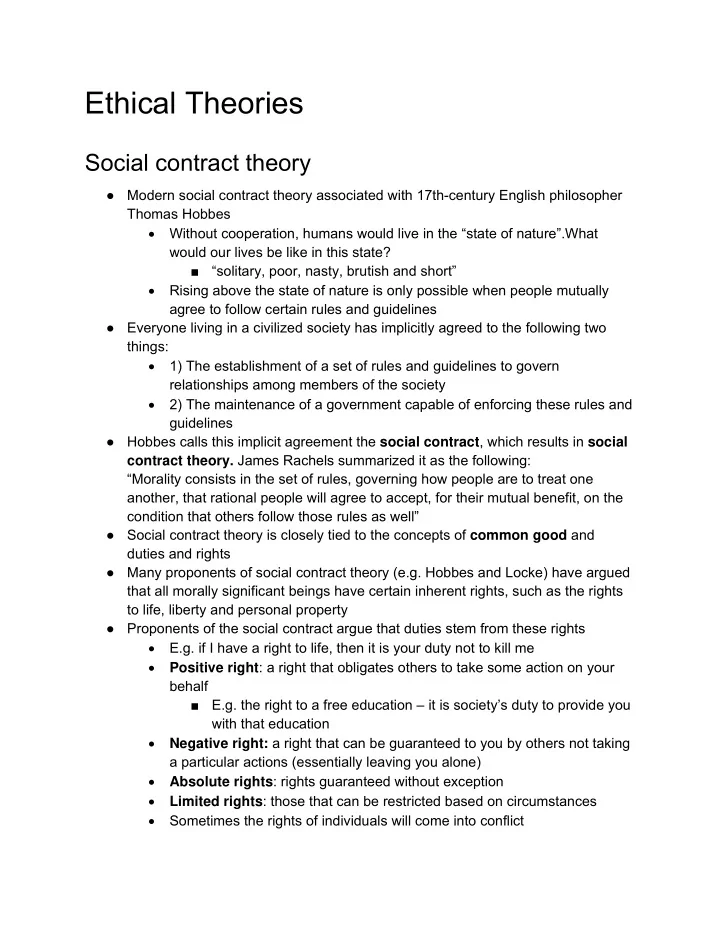

Ethical Theories Social contract theory ● Modern social contract theory associated with 17th-century English philosopher Thomas Hobbes Without cooperation, humans would live in the “state of nature”.What would our lives be like in this state? ■ “solitary, poor, nasty, brutish and short” Rising above the state of nature is only possible when people mutually agree to follow certain rules and guidelines ● Everyone living in a civilized society has implicitly agreed to the following two things: 1) The establishment of a set of rules and guidelines to govern relationships among members of the society 2) The maintenance of a government capable of enforcing these rules and guidelines ● Hobbes calls this implicit agreement the social contract , which results in social contract theory. James Rachels summarized it as the following: “Morality consists in the set of rules, governing how people are to treat one another, that rational people will agree to accept, for their mutual benefit, on the condition that others follow those rules as well” ● Social contract theory is closely tied to the concepts of common good and duties and rights ● Many proponents of social contract theory (e.g. Hobbes and Locke) have argued that all morally significant beings have certain inherent rights, such as the rights to life, liberty and personal property ● Proponents of the social contract argue that duties stem from these rights E.g. if I have a right to life, then it is your duty not to kill me Positive right : a right that obligates others to take some action on your behalf ■ E.g. the right to a free education – it is society’s duty to provide you with that education Negative right: a right that can be guaranteed to you by others not taking a particular actions (essentially leaving you alone) Absolute rights : rights guaranteed without exception Limited rights : those that can be restricted based on circumstances Sometimes the rights of individuals will come into conflict
● According to social contract theory, people make ethical decisions based both on their feeling of duty or obligation and also based on fear of punishment for breaking the contract ● What are some problems associated with social contract theory? Power hungry governing body Not everyone can agree on what the common good is or what are the moral rules rational people would accept to live in harmony with each other How to change the social contract if you don’t agree with it? Could be susceptible to majority rule if the social contract does not protect minorities How to keep track of the social contract if the rules are complex The rules don’t affect everyone equally Free-rider problem: where individuals benefit from everyone else’s effort to maintain the common good without doing their own part Unequal sharing of burdens Rawls’ Theory of Justice Rawls revived interest in social contract theory by proposing a theory of “justice as fairness” People from societies in order to secure benefits of social cooperation, but every society also has competition about how those benefits are distributed In addition to establishing people’s rights and duties, the social contract must also determine a just way of distributing “the benefits and burdens of social cooperation” How do we establish these principles of justice when people’s natural inclination is to be selfish? (Rawls) Principles of justice could be arrived at by placing everyone in an original position behind a veil of ignorance that prevented them from knowing the place they would hold in society (e.g. class, gender, race, social status). o He claimed that agreements made from this original position would be fair o Since people wouldn’t choose principles of justice that could end up harming them once their place in society was established From this proposal, Rawls arrives at two principles of justice: o Every person may claim a “fully adequate” number of basic rights and liberties (e.g. the right to free thought and speech, the right to be safe from harm, etc.) so long as these claims are consistent with everyone else having a claim to the same rights and liberties o Any social and economic inequalities can be justified if they satisfy two conditions:
They are associated with positions in society that everyone has a fair and equal opportunity to assume They are “to be the greatest benefit of the least-advantaged members of society” ( the difference principle ) o Rawls’ principles of justice and the difference principle in particular, are closely related to the concepts of equality and equity Equality: treating everyone the same Equity: giving everyone what they need to be successful
Recommend
More recommend